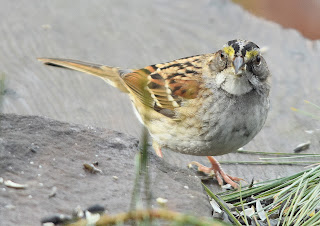NATURE MONCTON NATURE NEWS
Dec 22, 2024
Nature
Moncton members as well as any naturalist in New Brunswick or beyond are invited to share their photos and
descriptions of recent nature sightings to build a fresh (almost) daily edition
of Nature News
To respond
by e-mail, please address your message to the information line editor, nelsonpoirier435@gmail.com .
Please
advise the editor at nelsonpoirier435@gmail.com and proofreader Louise Nichols at Nicholsl@eastlink.ca if any
errors are noted in wording or photo labelling.
For more information on Nature Moncton, check the website at www.naturemoncton.com .
Proofreading
courtesy of Louise Nichols at nicholsl@eastlink.ca
**After the first heavy snowfall of the year
overnight, Jane LeBlanc in St. Martins stood at her window, cozy and warm, and
watched the birds arrive at her feeder. All the usuals were there, including White-throated
Sparrow, American Goldfinch (photographed days earlier before the
snow), White-breasted Nuthatch, Purple Finch, Northern
Cardinal, and American Tree Sparrow. Also present, but not
photographed, were many Evening Grosbeaks but surprisingly, no Blue Jays (yet).
Jane sends a photo of her feeder setup. The
'artist' easel was built by hubby Eddie. In summer, it is filled with flowerpots.
In winter, Jane sets it up right in front of the dining room window, covers the
edges with boughs -pine cones with peanut butter on them, a suet feeder hangs
from the center, and later, Jane will put the frozen Mountain Ash berries from
her freezer in around the frame.
**Peter and Deana Gadd had a lot of activity
at their feeders on Saturday, influenced by the snowy conditions. Perhaps the
guest of honour was a Rusty Blackbird that has been visiting almost
daily for the last 10 days. It had no trouble rummaging in a couple of inches
of snow to find something to eat. Seven or eight Dark-eyed Juncos also seemed
to do well finding their buried treasure in the snow but have been adapting to
dining at feeders too. The Northern Cardinal did not go without.
Fourteen Mourning Doves wisely had breakfast early before much snow
accumulated. The busy feeders were occupied throughout the day by Hairy
and Downy Woodpeckers, a couple of American Tree Sparrows, and some American
Goldfinches. Blue Jays, of course, made their presence felt.
European Starlings were not to be left out, and so too were a couple of
scrounging Rock Pigeons. Quite a lot of ‘natural’ entertainment for a day
spent mostly indoors!
(Editor’s note: it’s always great to get
reports of Rusty Blackbirds. The literature suggests this species has decreased
in numbers by up to 90%. A few feeder reports over the past few years have had
small flocks, which is very rewarding but is a very small sample. As with all
dwindling wildlife species, the female component is crucial. Peter and Deana’s patron
is clearly a female, as Peter’s photo shows the distinctive female head pattern
of the rusty crown and prominent pale supercilium (arrowed). The male has this feature as
well but very muted.)
**The Common Gull (Larus canus) is a European (British Isles mainly) that visits the eastern coast of North America, mostly in the winter months. It is seen in St. John's, Newfoundland, and Labrador in winter most years and in Nova Scotia less commonly but regularly. It has visited New Brunswick and is definitely one to watch for to give birders a gull rush.
Bernard Burke shares some documentary photos
of a Common Gull he stumbled upon
with a group of gulls in a parking lot in Dartmouth, NS, that show some
identification features to be on the watch for. Note the yellow/green bill with
a faint dark band at the tip, the dark eye, the patch of white inner flight
feathers (feathers that will form part of the bright white trailing edge),
which is arrowed in the photo, and the pale yellow-green legs. This is also a
small gull at 16 in. that will stand out in a group.
Just
as we checked goose flocks in the fall, check gull groups in the winter for
surprise tagalongs!
Nelson Poirier
Nature Moncton
.%20DEC%2020,%202024.%20BERNARD%20BURKE.jpg)
.%20DEC%2020,%202024.%20BERNARD%20BURKE%20.tif)
.%20DECEMBER%2021,%202024.%20%20PETER%20GADD%202.jpg)
.%20DECEMBER%2021,%202024.%20PETER%20GADD%202.jpg)




.%20DEC.%2021,%202024.%20JANE%20LEBLANC.JPG)
.%20DECEMBER%2021,%202024.%20PETER%20GADD.jpg)
.%20DEC.21,%202024.%20JANE%20LEBLANC.JPG)


.%20DEC%2021,%202024.%20JANE%20LeBLANC.jpg)
No comments:
Post a Comment